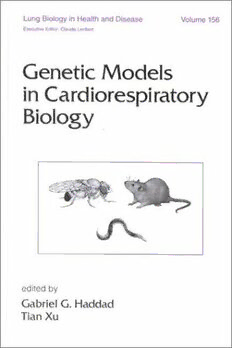
Lung Biology in Health & Disease Volume 156 Genetic Models in Cardiorespiratory Biology PDF
482 Pages·2001·3.337 MB·English
Most books are stored in the elastic cloud where traffic is expensive. For this reason, we have a limit on daily download.
Preview Lung Biology in Health & Disease Volume 156 Genetic Models in Cardiorespiratory Biology
Description:
Focusing on the latest breakthroughs in genetic analysis and manipulation, Genetic Models in Cardiorespiratory Biology extensively details how genetic model systems facilitate better comprehension of mammalian and human biology and disease. Highlights studies of Drosophila melanogaster, Caenorhabditis (C.) elegans, zebrafish, and transgenic mouse models-revealing high functional conservation to homologous genes in humans and promoting insight into biological processes! Applying technical and research advances toward the discovery of potential therapeutic gene agents, Genetic Models in Cardiorespiratory Biology ·summarizes current knowledge of cellular movements underlying heart tube morphogenesis and the role of genetic analysis in identifying critical molecules in cardiac development and formation ·illustrates the heterogeneity of tissue responses to hypoxia with genetic and invertebrate examples ·describes the control and influence of oxygen homeostasis by hypoxia-inducible factor-1 (HIF-1) on embryogenesis, physiology, and disease pathogenesis ·uses the Drosophila model to show the interface between global specification of cardiac competence and cell-type specific differentiation within the developing embryo ·studies over 40 mutations in zebrafish and mouse genes detailing vertebrate heart development, distinguishing novel genes in cardiac development, and delineating signaling pathways ·demonstrates the fundamental asymmetrical structure of the node monocilium through leftright asymmetry abnormalities ·considers the role and relationship of apoptosis in vertebrates and to the development of immune and cardiac systems, autoimmune and cardiac diseases, and cancer ·presents evolving paradigms in vasculogenesis and angiogenesis and the importance of the vascular endothelial growth factor (VEGF) family ·and much more! Written by nearly 25 experts in the field and supplemented with more than 1600 literature references, drawings, photographs, and tables, Genetic Models in Cardiorespiratory Biology satisfies the reference needs of pulmonologists and pulmonary disease specialists, geneticists, cardiologists, physiologists, biochemists, molecular and cell biologists, neonatologists and pediatricians, pathologists, anatomists, and graduate-level and medical school students in these disciplines.
See more
The list of books you might like
Most books are stored in the elastic cloud where traffic is expensive. For this reason, we have a limit on daily download.
